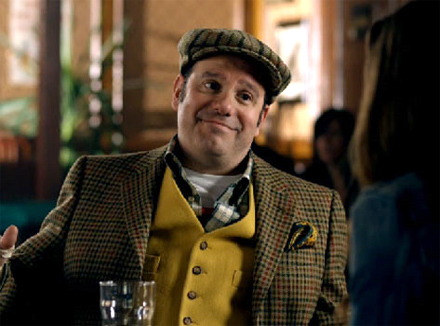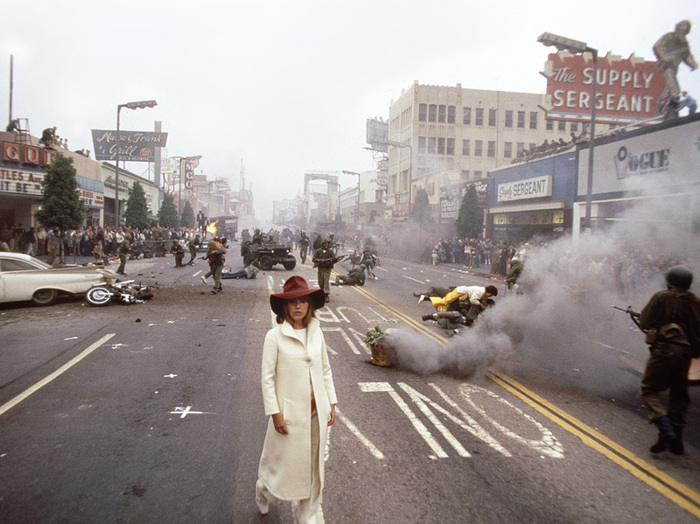Daniel Mendelsohn is making waves with his
slam at Mad Men in
The New York Review Of Books. I'm sure he believes what he writes, and it's always good business to attack the critically exalted, but his essay doesn't add up to much.
Mendelsohn likes TV. He likes
The Sopranos and
The Wire and
Battlestar Galactica and
Friday Night Lights. As for
Mad Men, however:
The writing is extremely weak, the plotting haphazard and often preposterous, the characterizations shallow and sometimes incoherent; its attitude toward the past is glib and its self-positioning in the present is unattractively smug; the acting is, almost without exception, bland and sometimes amateurish.
Worst of all—in a drama with aspirations to treating social and historical “issues”—the show is melodramatic rather than dramatic. By this I mean that it proceeds, for the most part, like a soap opera, serially (and often unbelievably) generating, and then resolving, successive personal crises (adulteries, abortions, premarital pregnancies, interracial affairs, alcoholism and drug addiction, etc.), rather than exploring, by means of believable conflicts between personality and situation, the contemporary social and cultural phenomena it regards with such fascination: sexism, misogyny, social hypocrisy, racism, the counterculture, and so forth.
He says the plotting is haphazard and preposterous, yet he likes
The Sopranos (where
Mad Men creator Matthew Weiner got his chops). Both shows are full of varied characters who go through many crises--that's what drama is about--but Weiner, like David Chase before him, has a different sort of plotting. He'll often avoid obvious dramatic payoffs by making you expect something and then getting something else. I guess that can appear haphazard and preposterous, but to a lot of viewers, who can tell you exactly how most plots will end up, it's refreshing, even exhilarating.
Furthermore, when characters don't always respond as you expect (Don's enemy is Duck, but sometimes he supports Duck; Joan's husband is an awful doctor who rapes her, but he's a sweet guy with a great bedside manner), it's a nice change of pace. Or, if you believe Mendelsohn, it's incoherent.
As for its look at the 60s, yes, the design gets a lot of attention. And it does tend to play up some things that seem outrageous today--pregnant women smoking, kids playing without proper safety precautions, outrageous sexism, etc. But the show has to deal with this stuff--it can't ignore them or why bother? Does it exaggerate? Perhaps a bit, but drama has to play things up--exaggerate--for effect. A cop show (like
The Wire) has more action in an episode than most real cops see in a year. What's great about
Mad Men is, after a while, you accept much of the behavior, even if you don't excuse it. (And, I would hope, it doesn't make you complacent or smug. I realize a lot of crusaders believe we have to flagellate ourselves all the time (along the lines they approve of), but I have no trouble with looking at the past and noting, at least in some ways, we have made progress.) Does it also glorify some of this activity? Yes, but that's also part of the appeal. Much of the show is a visit to a different country, so similar, so different. Noting the strangeness, but making it part of the drama, is a major achievement of the show. Mendelsohn may not approve how they play up these aspects, but I can tell him if this is all the show had to offer, rather than characters the audience cares about in compelling situations, viewership would have dropped off each episode, rather than risen every year. Shock and decor can only get you so far.

As to the soap opera charge, there's a thin line between drama and melodrama. It's not necessarily about incident so much as how these incidents are handled.
Mad Men sometimes covers the same territory, and even threatens to go overboard, but it does things real soap operas don't pull off. (And it does it without the advantage
The Sopranos or
The Wire have--it can't kill people on a regular basis to keep up the excitement level.) Problems aren't resolved as expected. Of course there are dramatic situations, but you don't know how Don and gang will respond. Don certainly doesn't always triumph (as Mendelsohn later implies), and all characters are on edge, ready to do things that we can't foresee, but understand after they've done them. And it's all performed with incomparably better dialogue.
As for resolving successive personal crises, there's a certain amount of that--that's what serial drama means. But, in fact, this is a show, unlike most, where a fact can be forgotten, only to be brought back the next season, and have a devastating effect. Where character problems are not conveniently solved, but nag at them--even when they understand how devastating they are, they still can't always help themselves
I'm not saying the show isn't overpraised. It has plenty of flaws. One season offered a whole lot of stuff with Betty at the stables that offered little entertainment and less enlightenment. It is true sometimes certain 60s themes are dealt with rather glibly (if entertainingly). And some of the secondary characters, such as Peggy's hipster friends, border on caricature.
Still, I can't think of too many shows in the past decade, during this golden age of television (as Mendelsohn puts it), as gripping as
Mad Men, and I can't think of a single one that does it within the given set of limitations it's created for itself.
PS This essay done properly would point out flaws in specific examples Mendelsohn chooses, and note specific counterexamples. Since I wrote this quickly, and am not planning to come back and do it right, I can only suggest you watch the show and decide for yourself.


























